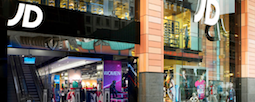The UK’s Competition and Markets Authority (CMA) said on Tuesday the £90 million acquisition of Rochdale-based Footasylum plc by Bury-based FTSE 100 retailer JD Sports Fashion Plc “could leave shoppers worse off, both in-store and online.”
The CMA said its in-depth Phase 2 investigation of the deal “has provisionally found that the deal substantially lessens competition nationally.”
The CMA said its current view “is that blocking the deal by requiring JD Sports to sell the Footasylum business may be the only way of addressing these competition concerns.”
Pentland Group, which owns brands including Speedo, Canterbury, Berghaus and Lacoste Chaussures, is a major shareholder of JD Sports with a stake of more than 50%.
JD Sports shares rose about 3.5% to around 875p to give the firm a current stock markte value of £8.2 billion.
“The CMA has also today set out potential options for addressing its provisional concerns,” said the watchdog.
“It is now asking for views on its provisional findings by 3 March and possible remedies by 25 February and will assess all evidence provided before making a final decision …
“The deadline for the CMA’s final report has been extended to 11 May 2020.”
The CMA added: “The CMA is concerned that the loss of competition from the merger could mean that shoppers see fewer discounts, for example from clearance sales and Black Friday promotions, or receive a lower quality of customer service.
“It could also lead to less choice in stores and online.
“JD Sports and Footasylum both sell sports-inspired casual clothing and footwear in stores across the UK and online through their websites.
“The £90 million deal was announced and completed last year.
“The sportswear sector is growing.
“In 2018 UK consumers spent more than £5 billion on sports clothing and footwear, and sportswear has become increasingly fashionable, particularly amongst young people.
“While JD Sports is the largest retailer in this market with around 375 stores nationally and Footasylum is smaller, the CMA’s detailed investigation has provisionally found that they compete closely, and surveyed customers indicated that there are only a small number of other retailers that they would consider buying from.
“In reaching this provisional decision, the CMA looked at a large volume of evidence.
“This included data from 2 surveys of more than 10,000 JD Sports and Footasylum customers, documents from the companies, their competitors and suppliers and financial information from both of the merging businesses.”
Kip Meek, chair of the independent inquiry group leading the investigation, said: “This is a large and growing market in the UK, so it is important that the CMA carefully scrutinises a deal between 2 key rival businesses.
“We’re currently concerned that shoppers could lose out after the merger, for example through fewer discounts and less choice in stores and online.
“This could particularly affect younger customers and students, who shop in JD Sports and Footasylum.”
JD Sports executive chairman Peter Cowgill said: “The CMA’s provisional decision is fundamentally flawed and demonstrates a complete misunderstanding of our market to an alarming extent, given its six-month review.
“The competitive landscape described by the CMA is one which neither I, nor any experienced sector analyst, would recognise.
“Just take a walk down any major UK high street or search for Nike or adidas trainers on Google and you can see for yourself how competitive this marketplace really is.
“The CMA’s provisional findings do not reflect the objective evidence, with excessive weight being placed on surveys asking hypothetical questions of a small sample of selected customers equivalent to less than 25% of the footfall of one JD store in Manchester for one week, rather than assessing the reality of how consumers actually shop on a national scale.
“When the group made its offer in March 2019, it was our intention to support Footasylum and its employees to grow the business and increase the quality, range and choice of products available to customers.
“We remain convinced that a combination of the two businesses would provide significant long-term benefits to customers, colleagues and brand partners, while maintaining Footasylum’s presence on the high street as the music-inspired casual retailer which it is today.”
